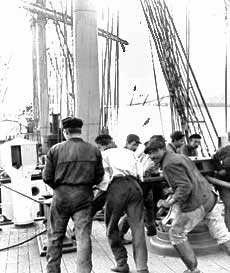The legend of Billy Budd is a tragedy of two accounts. We are readily aware of the tragedy that befalls Billy Budd but the martyr on the other end of the scale is not as generously portrayed or as easily seen. We are intuitively drawn to the plight of Billy Budd for he is an amiable character filled with generosity, exhuming good nature toward his mates. His disposition is always friendly and even in his final moments his message is in honor of Captain Vere. We are expected to feel remorse for his tragic ending but at the same time our nature leaves us painfully indifferent towards the fatal end of a character of less desirable traits. Billy’s good nature rests on a delicate balance with the malice of Master-at-Arms, Claggard. The true tragedy of the story lies in the sacrifice of both Billy Budd and Claggard caused by their own irreconcilable dispositions, for both were led blindly toward an inevitable noose. The path of the ignorantly innocent falls to the same doom of the maliciously intelligent.
Claggard and Billy Budd are portrayed in very much opposing sentiments and temperaments. Where Billy is cherished by his shipmates, Claggard is held in contempt for his position of authority and a slightly ominous temperament. Claggard’s position as Master-at-Arms was the source of much of the contempt held towards him as Melville alludes, “the less credence was to be given to the gun-deck talk touching Claggart, seeing that no man holding his office in a man-of-war can ever hope to be popular with the crew.” But it was by his rise to success, his ascent from naval novice to his position of power aboard a man-of-war ship, that his “superior capacity” is exposed. Claggart is a man of exceeding intelligence; a man soaked of intellectuality that has absorbed a partiality, or more aptly a need of sinister processes. It is a desire that proves difficult in capturing for clear investigation but can perhaps be depicted by a particular delight of a white dove falling into the grips of a ravenous hawk. It is a deeply embedded, depraved tendency, one I can only hint towards, that is espoused by Claggart, one that finds stems from a natural aptitude for judgment.
Billy Bud is void of all these harsh judgments that attribute to Claggart’s complex character and plague him of the contempt he harbors for Billy. Untainted by the curiosity that and Billy remains satisfied with his simple disposition. The intellect symbolically bears a stutter. Like a child, Billy has remained through Time’s effort to One gifted with the qualities of many men’s desire but without a conscience, without a process of. A natural process the comfortable gown of naiveté is slowly stripped from us, we must suffer the weathering of time and age lest our vision becomes blinded. Free from envy and malice. If askance he eyed the good looks, cheery health and frank enjoyment of young life in Billy Budd, it was because these went along with a nature that, as Claggart magnetically felt, had in its simplicity never willed malice or experienced the reactionary bite of that serpent [1]. This is partially accounted for by the natural life of a sailor. A sailor’s life is straightforward. Melville describes the class of sailors to be a “juvenile race,” a life that is a “barren game hardly worth that poor candle burnt out in playing it”. In certain matters., some sailors remain unsophisticated enough. But a young sea-farer of the dispostion of our athletic foretopman is very much of a child-man.230 “One person excepted, the Master-at-arms was perhaps the only man in the ship intellectually capable of adequately appreciation the moral phenomenon presented in Billy Budd. And the insight but intensified his passion, which assuming various secret forms within him at times that of cynic disdain-disdain of innocence.”224
And yet a child’s utter innocence is but its blank ignorance, and the innocence more or less wanes as intelligence waxes.
A parallel, or rather a paradox, can be drawn between Claggart and Billy Bud in this respect. On one side Claggart stands, a man gifted, or plagued, with an intelligence that reveals to him a deeper sense of self and the reality that surrounds but he is tainted through its wisdom. His is like Man as he was dispelled from Eden. His heart is guarded and cautious, calloused from the beatings of truth. Claggart is a man of chaotic complication but in his excess of intellect, his unquenched thirst for knowledge has led him in the ruthless quest Billy is a beautifully simple character. Claggart contains a need for sinister processes because it is a deeper desire of man, something more satisfactory than wealth or material. The relationhip between Claggart and Billy Bud is much like a man who looks back upon his lost perfection. Perhaps this is Melville’s portrayal of the human condition. Billy Budd’s innocence is a condition that proved just is misleading as Claggard’s malice. So could it be said that the two are equal fates. There is a deep relationship between Claggards envy and the ignorance of Billy. It was a combination of both of their dispositions that led to both of their deaths. I see Billy Budd as a pitiful character. Billy Bud suffered a just consequence for his inability to accept a world of deceit. We must allow evil to seep into our conscious. The handsome sailor is a title to be revered. Claggart is constantly reffered to by Mellville as a malicious It was innocence that led Billy Budd to the mutinous meeting. It is destiny that drives a man of righteousness and innocence to the noose.
